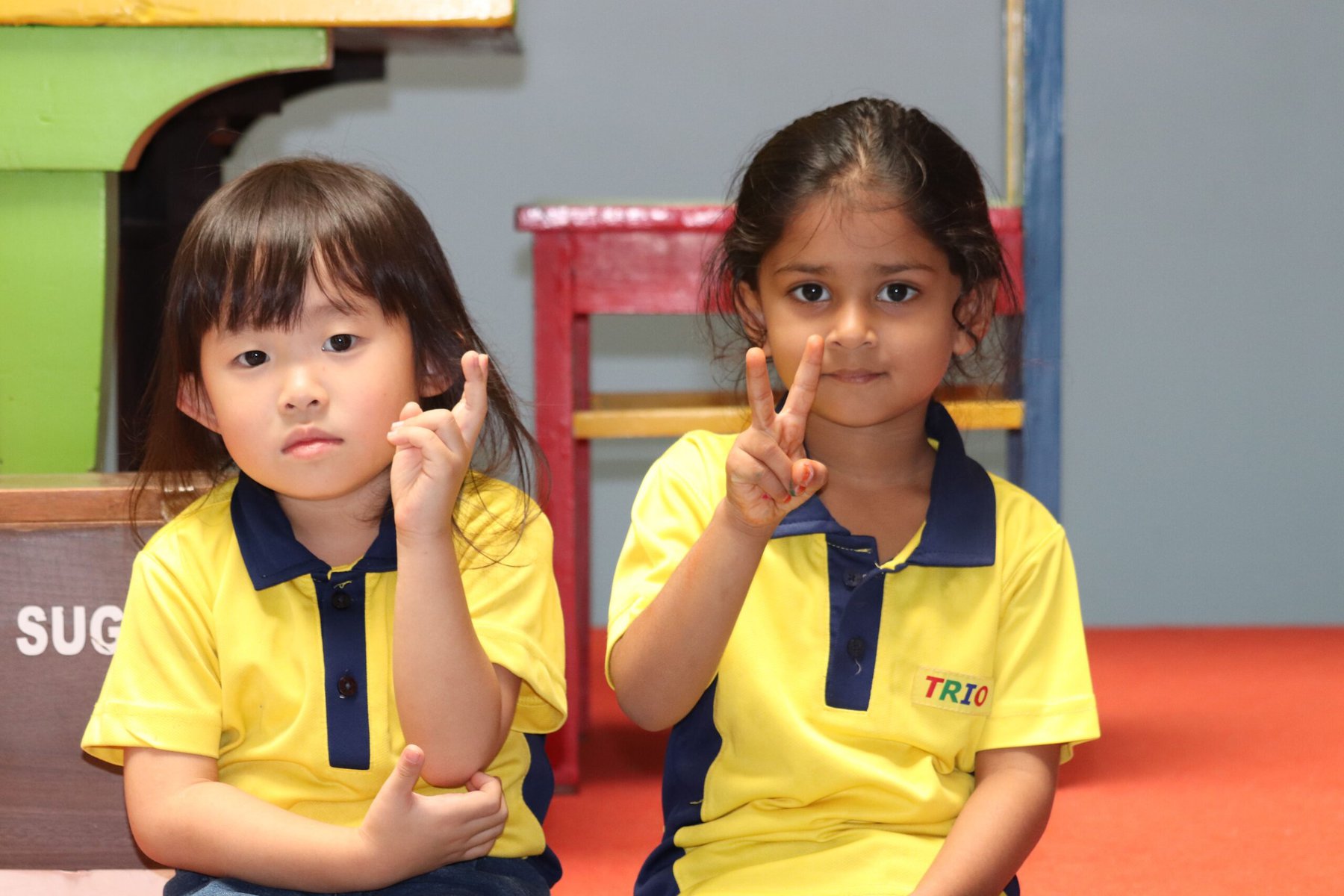About TRIO World Academy
TRIO World Academy (TWA) is an authorized IB World school, located in Bangalore, Karnataka, India. It was established in 2009.
TWA caters to the educational needs of a vibrant multicultural community of students from 18+ countries. TWA teachers, who come from all over the world, bring their unique combination of world knowledge, and expertise. TWA offers IB PYP, Cambridge Secondary 1, IGCSE and IB DP. The school instills in students the core values of Leadership, Discipline, Academic Excellence and Service, preparing them to become the global leaders of the future.
Education is driven by relationships. TRIO’s focus is on building strong relationships with families and children from the get-go, whether the child becomes part of the student community or not. TRIO gives high priority to student happiness and keeping the campus free of bullies. The school recently was recognised as an “Institution of Happiness” by QS I-GAUGE in association with industry body ASSOCHAM. They have also partnered with the Global Schools Alliance, who provide schools with a platform for sharing best practices and resources to enhance school improvement, teacher development and student transformation.
Selection Process
The school follows a transparent admission process. It is structured to give each applicant an equal chance at getting into the school. The school also encourages students from different backgrounds, walks of life and needs to seek admission.
One of the fundamental steps of the admission process is sitting down with parents, exploring shared values and giving them an accurate picture of the school’s culture and ethos. Accurate expectations about what their child would experience at the school are set in the early stages. Admission counselors look to understand a child’s skills, strengths, challenges, and goals. The assessment tests that follow are focused on understanding the needs of the child.
The TRIO SEN programme supports learners with diverse capabilities. Understanding the child well helps teachers create a differential learning plan and support them as per their individual capacity. The school also works with parents to assign the child a grade that is most suitable to them.
Ensuring a Campus without Bullying
School reports from the previous school are examined by the admission officer and coordinator for every child entering the admission process at the school, to understand their behavior and motivations. The school implements a rigorous anti-bullying policy which is part of the broader child safety policy.
When a student is admitted to the school, a family handbook is issued to all families. The handbook contains information about the school’s culture, policies, and practices. The school urges parents to read, understand and talk about the handbook with their child. The aim is to ensure that the parents and child understand the school’s code of conduct, culture of respect and inclusivity. Since children can resort to problematic behaviors in response to feeling unseen or unheard, the school assigns buddies to new students and teachers are warm and friendly.

Creating Ease for Families
The pandemic has reduced the opportunities for going through an extensive admission process that allows both parties to understand that they are a good fit for each other.
To overcome this barrier, the school has taken steps to ensure that the families fully experience what TRIO has to offer, culturally and curriculum-wise, wherever the family may be. The families that approach the school for admission inquiries at TRIO are treated with the same regard and importance whether they connect online or in person. The admission process is flexible enough to accommodate mid-term admissions too.
A system is in place where families can explore and follow through with the admission process from wherever they are. This includes conversations with admission officers/counselors, or with the head of school or coordinators, support for submission of documents and a virtual school tour.
School leaders have an open-door policy with stakeholders in the TRIO community. Parents who are in India avail appointments and interact with leaders and educators at TRIO.
First Time International School Students
Several of the school’s applicants are students from other Indian national curricula schools or from a different country. They may or may not have had the experience of studying at an international school.
The school offers them the novel option of trial days, where they get to be a student, just like a regular enrolled student at TRIO and experience the day-to-day activities a regular student would engage in like classes, library periods, lunch, PE, extracurriculars and other school events.
Trial students are also assigned a buddy and closely supported by the teachers/coordinator to make sure that they have a continuous sense of belonging with the rest of the school. The trial days can simplify the decision-making process for families, as to whether they want to choose TRIO or seek admission elsewhere.
Accommodations for Students from Non-international Curricula
TRIO also offers a bridging programme for students from curricula other than the IGCSE and IB. Students have the opportunity to become comfortable with the approaches to teaching and learning in an international curriculum. The bridging programme has a schedule that helps enhance students’ confidence and self-sufficiency to ease into the international curriculum. Teachers also provide individualized programmes after the bridging programme to transition into their new educational path with our international school programmes.
Making International Schooling More Accessible
TRIO provides full scholarships on tuition for exceptional academic and non-academic achievements. An international education can be life changing for students from economically disadvantaged backgrounds.
The school continues to work on creating and maintaining a culture that promotes safety, inclusivity and well-being, which is foundational for a fair admission process.
*QS I-GAUGE is a private and independent body that carries out assessments of educational institutions as per strict standards of quality.


